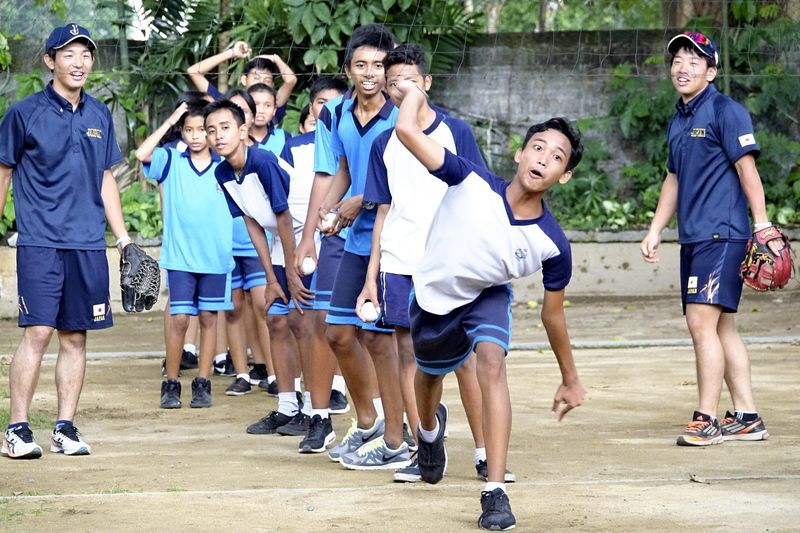The circle of baseball widens in Southeast Asia

The Yomiuri Shimbun July 10 - Efforts by a league of Japanese universities to promote baseball in Southeast Asia are bearing fruit — a friendly baseball championship will be held this autumn at the league’s initiative, inviting teams from three Southeast Asian countries.
The Tohto University Junko Baseball League is composed of 35 universities, mainly in Tokyo, and is working to promote baseball with a semihard ball. It began exchanges with baseball players in Southeast Asia in 2013, after league vice president Tomohiro Sugiyama became acquainted with a Japanese coach for Indonesia’s national baseball team.
Sugiyama, 34, learned that baseball is not very popular in Indonesia and decided to promote it there. He’s visited the country at his own expense many times.
As their relationship has deepened, a team selected from among league members has toured Indonesia every year since 2016.
The league conducted a friendly match in 2016, and it held not only games in 2017 but also baseball training sessions. In November this year, it will hold a baseball championship featuring teams from four countries — Japan, Indonesia, the Philippines and Singapore. Semihard balls are used in games and training.
According to Sugiyama, regular hard baseballs made of leather get damaged easily in regions that have a long rainy season, so they quickly need replacing. As a result, the cost for balls tends to be high, which is apparently one of the reasons why baseball is not widespread in Southeast Asia.
However, semihard balls with a rubber surface are durable and resistant to rain.
Sugiyama made a proposal to the Indonesian side, saying, “With semihard balls, players can feel like they’re playing baseball with regular baseballs, so it’ll be possible to improve techniques and skills by using semihard balls.” His suggestion was accepted, and the league and supporting companies began providing semihard balls.
For players in the Philippines and Singapore, the friendly championship scheduled this autumn will be their first opportunity to play baseball with semihard balls. Sugiyama was the captain of the baseball team of the Third Senior High School of Nihon University in 2001, when it captured the summer title of the National High School Baseball Championship.
At Nihon University, he played in the semihard ball baseball club. Since then, he’s been involved in baseball as a coach or officer of the league.
“To spread baseball worldwide, it’s important to promote the sport in regions where the player population is small,” Sugiyama said.
Nozomi Morikane, 20, a third-year student at Nihon University belonging to the semihard ball baseball club, served as an instructor in Indonesia last year.
“People in Southeast Asia are positive and quick learners. I felt their genuine desire to be better at baseball,” he said.
“It also helps students acquire an international way of thinking,” Sugiyama said. “I want to continue this activity for a long time and convey the fun of baseball to many people.”
Different makes of ball
Baseball with a semihard ball is said to fall between the regular game and rubber-ball baseball.
A rubber ball is hollow with a natural rubber surface, while a regular baseball is made by winding thread around cork or rubber and wrapping it with bull leather or other materials.
The inside of a semihard ball is almost the same as that of a hardball, but it’s covered with natural rubber, just like a rubber ball. The feeling when batting and the way the ball bounces are almost identical to regular baseballs. The other equipment and the rules are also the same as for regular baseball. Semihard ball baseball is especially popular among universities, and many universities have clubs for the sport.



